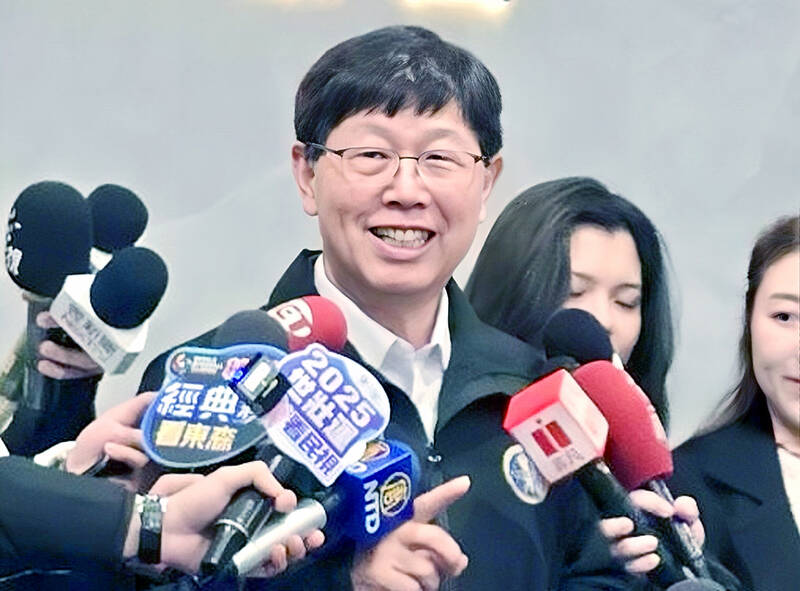Hon Hai Precision Industry Co (鴻海精密) is open to buying Renault SA’s stake in Nissan Motor Co, a move that might offer the struggling Japanese automaker a lifeline.
The Taiwanese company has approached Nissan and Honda Motor Co about potential cooperation, Hon Hai chairman Young Liu (劉揚偉) told reporters yesterday on the sidelines of a company event in New Taipei City.
Liu also said his firm would announce a new Japanese customer for its electric vehicle (EV) contract manufacturing business in the first quarter, although he did not specify the name or scale of production in brief remarks.

Photo: Fang Wei-chieh, Taipei Times
Apple Inc’s main production partner had previously considered picking up the French firm’s 36 percent slice of Nissan.
Hon Hai, for years the largest manufacturer of iPhones and electronics for global brands, has been venturing into newer arenas such as EVs to offset stalling smartphone sales.
The company, known also as Foxconn Technology Group (富士康科技集團), had adopted a wait-and-see attitude while Honda and Nissan worked out a plan to integrate their businesses. The Japanese automakers are now considering ending their alliance talks.
“If there’s an operational need, we will consider it,” Liu told reporters when asked if Foxconn would buy Renault’s stake in Nissan. “But buying the stake isn’t our goal — our goal is cooperation.”
Nissan and Renault declined to comment on Liu’s remarks.
Over the past year, Hon Hai has benefited from surging demand for the Nvidia Corp servers that power artificial intelligence (AI) development. However, in EVs, the world’s largest contract electronics maker has been unable to gain a sure footing.
“From Hon Hai’s point of view, it is not a merger case, but a partnership,” Liu said when asked about a possible merger with Nissan. “How can we partner with Japanese automakers? We met with many companies and Nissan and Honda are among them.”
Meanwhile, US President Donald Trump’s recent introduction of trade tariffs and potential future adjustments are unlikely to have a direct impact on Hon Hai, Liu said.
In response to Trump’s manufacturing initiative, Liu mentioned that Hon Hai is considering establishing new sites in locations across the US in collaboration with its partners.
While Trump’s tariff policy is aimed at reshoring manufacturing to the US, any changes would have a small effect on the manufacturing giant, regardless of whether production is based in Taiwan or the US, Liu said.
However, Liu also acknowledged that tariff hikes could lead to a global market contraction.
In light of this, the company would adjust its high-end AI server production capacity in Taiwan, the US, Mexico and Vietnam as needed, he said.
On the back of its AI server business, Hon Hai is on track to post NT$7 trillion (US$213 billion) in revenue this year, with the potential to approach NT$8 trillion depending on market developments, he added.
Additional reporting by CNA

KEEPING UP: The acquisition of a cleanroom in Taiwan would enable Micron to increase production in a market where demand continues to outpace supply, a Micron official said Micron Technology Inc has signed a letter of intent to buy a fabrication site in Taiwan from Powerchip Semiconductor Manufacturing Corp (力積電) for US$1.8 billion to expand its production of memory chips. Micron would take control of the P5 site in Miaoli County’s Tongluo Township (銅鑼) and plans to ramp up DRAM production in phases after the transaction closes in the second quarter, the company said in a statement on Saturday. The acquisition includes an existing 12 inch fab cleanroom of 27,871m2 and would further position Micron to address growing global demand for memory solutions, the company said. Micron expects the transaction to

Vincent Wei led fellow Singaporean farmers around an empty Malaysian plot, laying out plans for a greenhouse and rows of leafy vegetables. What he pitched was not just space for crops, but a lifeline for growers struggling to make ends meet in a city-state with high prices and little vacant land. The future agriculture hub is part of a joint special economic zone launched last year by the two neighbors, expected to cost US$123 million and produce 10,000 tonnes of fresh produce annually. It is attracting Singaporean farmers with promises of cheaper land, labor and energy just over the border.

US actor Matthew McConaughey has filed recordings of his image and voice with US patent authorities to protect them from unauthorized usage by artificial intelligence (AI) platforms, a representative said earlier this week. Several video clips and audio recordings were registered by the commercial arm of the Just Keep Livin’ Foundation, a non-profit created by the Oscar-winning actor and his wife, Camila, according to the US Patent and Trademark Office database. Many artists are increasingly concerned about the uncontrolled use of their image via generative AI since the rollout of ChatGPT and other AI-powered tools. Several US states have adopted

A proposed billionaires’ tax in California has ignited a political uproar in Silicon Valley, with tech titans threatening to leave the state while California Governor Gavin Newsom of the Democratic Party maneuvers to defeat a levy that he fears would lead to an exodus of wealth. A technology mecca, California has more billionaires than any other US state — a few hundred, by some estimates. About half its personal income tax revenue, a financial backbone in the nearly US$350 billion budget, comes from the top 1 percent of earners. A large healthcare union is attempting to place a proposal before